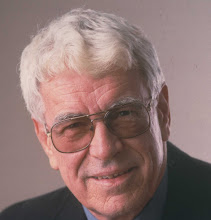January 18, 2009
“There are disadvantages in being in government in a small province,” writes Allan Blakeney in his recent memoir, An Honourable Calling (University of Toronto Press, 2008). “But there advantages, too. One of them is that the smaller scale allows one to plan and bring about many changes in a short time.” Denizens of Province House, please pay attention.
Blakeney hails from Bridgewater, NS, but he made his mark as NDP Premier of Saskatchewan from 1971 to 1982. His adopted province, he comments, has a long history as “a social laboratory for Canada.” In 1944, it gave us North America's first democratic socialist government, headed by the legendary Tommy Douglas, who soon brought in universal hospital insurance, followed in 1962 by Canada's first medicare program. Canadians today regard medicare as a defining feature of our country – but it was fiercely opposed at the outset, and it only came about after a bitter month-long strike by the province's doctors.
Blakeney was a minister in Douglas' cabinet, and in Woodrow Lloyd's after Douglas moved on to become the first federal leader of the NDP. He succeeded Lloyd as party leader in 1970, and became Premier after winning the provincial election of 1971.
Does it make a difference which party is in power? You bet it does.
Ross Thatcher's outgoing Liberal government had instituted user fees in medicare, and barred strikes in essential services. In its first two weeks in office, Blakeney writes, the NDP reversed both decisions – and also “we removed the medicare tax for people over 65; we reduced hours of work before overtime provisions kicked in; we gave extra protection to farmers against the seizure of their land and machinery by creditors; and we removed charges against the estates of patients who had received treatment for mental illness.”
That was the first fortnight. Blakeney's NDP later implemented Canada's first 40-hour work week, along with longer annual vacations, equal pay for women, and maternity and bereavement leave. It introduced Canada's highest minimum wage – and although business objected, as it always does, profits went up. “Employees who get good wages spend their money,” says Blakeney, “ and – big surprise – employers do well.”
The NDP's vision has always included an enhanced version of universal, comprehensive and accessible medicare that would include drug costs and dentistry, a vision still unfulfilled nationally. More than 30 years ago, however, Blakeney's Saskatchewan had both.
In 1971, Saskatchewan had the lowest per-capita ratio of dentists in Canada, and many families lived more than 50 miles from the nearest dentist. The government created a corps of 400 “dental therapists”with two years of training to provide routine dental services and dental hygiene instruction to all school children. The program was both effective and popular.
Pharmacare, meanwhile, made prescription drug coverage available to everyone. At its heart were “standing offer contracts” with major drug manufacturers based on public tenders for six-months' supplies of approved drugs. The tenders drove basic drug costs down, but pharmacies received an agreed mark-up and a dispensing fee. Normally, the province paid for the drug, and the patient paid the dispensing fee. The plan covered over 90% of the people using prescription drugs in the province.
Blakeney's government was ultimately defeated by Grant Devine's Progressive Conservatives. Blakeney led his party into one more unsuccessful election before retiring. Meanwhile, the Devine government dismantled the dental plan, turning dental care over to private clinics. It also modified the drug plan, says Blakeney, by introducing “financial barriers, with the result that fewer than 20 per cent of the potential beneficiaries received financial support.”
The dental program was never reinstated, although the pharmacare program was later revived. Blakeney notes that the same principles could guide a comprehensive national pharmacare scheme which would produce “massive savings for Canadians, either as taxpayers or patients or both.”
In office, Blakeney confronted many other major issues of late 20th-century Canada -- the National Energy Policy, the Constitution, uranium, native affairs, NAFTA, potash, rural decline and more. What dominates his book, though, is the deep decency of the man and his political philosophy, his in-the-bones vision of a society at once rational, prudent and caring. Canada owes a great deal to Saskatchewan – and to the Nova Scotian who was once its premier.
-- 30 --
Sunday, January 18, 2009
Allan Blakeney: A Genuine Public Servant
Labels:
Allan Blakeney,
medicare,
NDP,
New Democratic Party,
pharmacare,
Tommy Douglas
Subscribe to:
Post Comments (Atom)

1 comment:
Hi
Great Blog, keep it up
Surrey Dental
Post a Comment